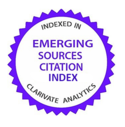Aplication of Lee-Carter and Renshaw-Haberman models in life insurance products
DOI:
https://doi.org/10.26360/2018_3Keywords:
mortality tables, provisions, risk management, longevityAbstract
The article analyzes differences between estimated premiums in life and mixed insurance products using the mortality/life tables for the Spanish insured population with the estimated premiums if we rely on the mortality/life tables based on the predictions made by the Lee-Carter model and the Renshaw-Haberman model. In the proposed scenarios, it is observed that the premiums calculated using the PASEM 2010 mortality tables are higher than those based on the Lee-Carter and Renshaw-Haberman models. However, it does not longer hold when the PERMF-2000P life tables are applied.
Downloads
References
Ayuso, M., Corrales, H., Guillen, M., Pérez-Marín, A. M. y J. L. Rojo (2007). Estadística Actuarial Vida, Ediciones UB, Barcelona.
Betzuen, A. (2010). Un análisis sobre las posibilidades de predicción de la mortalidad futura aplicando el modelo Lee-Carter. Anales del Instituto de Actuarios Españoles 16, 111-140.
Brouhns, N., Denuit, M. y J. K. Vermut (2002). A Poisson log-bilinear regression approach to the construction of projected life-tables. Insurance: Mathematics and Economics 31, 373-393.
Cairns A., Blake, D. y K. Dowd (2006). A Two-Factor model for stochastic mortality with parameter uncertainty: Theory and calibration. Journal of Risk and Insurance 73(4), 687–718.
Carter, L. R. y R.D. Lee (1992). Modeling and forecasting U.S. mortality. Journal of the American Statistical Association 87(419), 659-671.
Danesi, I. L., Haberman, S. y P. Millossovich (2015). Forecasting mortality in subpopulations using Lee–Carter type models: A comparison. Insurance: Mathematics and Economics 62, 151–161.
Debón, A. M., Martínez, F., Montes, F. y M. Moshuk (2015). Proyección de los indicadores de mortalidad para España. Estadística Española 57(188), 291-321.
Dickson, D., Hardy, M. y H. Waters (2009). Actuarial mathematics for life contingent risks, Cambridge University Press.
Haberman S. y A. Renshaw (2011). A comparative study of parametric mortality projection models. Insurance: Mathematics and Economics 48(1), 35–55.
INE (2018a). Indicadores de Mortalidad: Esperanza de Vida al Nacimiento según sexo. Instituto Nacional de Estadística (consulta realizada el 15 de octubre de 2018).
INE (2018b). Hipótesis nacionales de evolución demográfica 2016-2065, Tablas de Mortalidad proyectadas 2016-2065: Esperanza de Vida por edad y sexo. Instituto Nacional de Estadística (consulta realizada el 15 de octubre de 2018).
Lee, R. D. (2000). The Lee-Carter method of forecasting mortality, with various extensions and applications (with discussion). North American Actuarial Journal 4, 80-93.
Lee, R.D. y F. Nault (1993). Modeling and forecasting provincial mortality in Canada. The World Congress of the International Union for the Scientific Study of Population, Montreal.
Lee, R. D. y R. Rofman (1994). Modelación y proyección de la mortalidad en Chile. Notas 22 (59), 182-213.
Li, N., Lee, R. y S. Tuljapurkar (2004). Using the Lee–Carter Method to forecast mortality for populations with limited data. International Statistical Review 72 (1), 19–36.
Lundström, H. y J. Qvist (2002). Mortality forecasting and trend shifts: an application of the Lee-Carter Model to Swedish mortality data. International Statistical Review 72(1), 37-50.
McCarthy, D. y O. Mitchell (2010). International adverse selection in life insurance and annuities. En Tuljapurkar, S., Ogawa, N. y A. Gauthier (eds.) Ageing in advanced industrial states. International studies in population, 8, Springer, Dordrecht.
Mitchell, O., Poterba, J., Warshawsky, M. y J. Brown (1999). New evidence on the money's worth of individual annuities. The American Economic Review 89(5), 1299-1318.
Plat, R. (2009). On stochastic mortality modeling. Insurance: Mathematics and Economics 45(3), 393–404.
Renshaw, A. E. y S. Haberman (2006). A cohort-based extension to the Lee-Carter model for mortality reduction factors. Insurance: Mathematics and Economics 38(3), 556-570.
Tuljapurkar, S., Nan, L. y B. Carl (2000). A universal pattern of mortality declines in the G7 countries. Nature 405, 789-792.
Villegas, A., Millossovich, P. y V. Kaishev (2017). StMoMo: An R Package for Stochastic Mortality Modeling. Journal of Statistical Software, preprint.
Wilmoth, J. R. (1993). Computational methods for fitting and extrapolating the Lee- Carter Model of mortality change. Technical Report, University of California, Berkeley, USA.
Wilmoth, J. R. (1996) Mortality projections for Japan: a comparison of four methods. En Caselli, G. y A. López (eds.) Health and mortality among elderly populations, Oxford University Press, New York, 266-287.
Downloads
Published
How to Cite
Issue
Section
License
Copyright (c) 2023 Yovanna Macias, Miguel Santolino

This work is licensed under a Creative Commons Attribution-NonCommercial-NoDerivatives 4.0 International License.


















